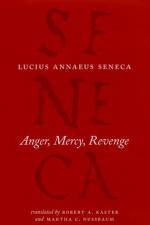|
This section contains 9,719 words (approx. 33 pages at 300 words per page) |

|
SOURCE: "The Evil Will," in The Mask of Power: Seneca's Tragedies and Imperial Rome, Bolchazy-Carducci Publishers, 1985, pp. 56-74.
In the essay below, the critics scrutinize the actions of Seneca's protagonists inorder to demonstrate that the characters willfully choose their courses of action.
1. Choices
When Seneca's bad men and women originate independent action, it is by conscious choice and with often self-regarding awareness:
Accingere, anime. …
scelus occupandum est.Be armed for battle, my soul. …
We must make the crime our own.
(Agamemnon 192-3.)
Clytemnestra is addressing a part of herself, her animus; perhaps 'heart' or even better 'will' is nearer to what the Latin term stands for, though 'soul' sounds more natural in English. (Studley piles up alternative equivalents:
Now heart be bold, take corage good, of stomacke now be stout. …
and when animus appears elsewhere in this scene he uses 'soule' and 'my mynde' also.) She is trying...
|
This section contains 9,719 words (approx. 33 pages at 300 words per page) |

|


